Wandall Group
We use gene editing, organotypic tissue models, and sophisticated mass spectrometry to decipher glycan functions. The genetically engineered cells and organotypic tissue model have provided evidence of the importance of glycans in tissue differentiation, cancer, and host-pathogen interactions.
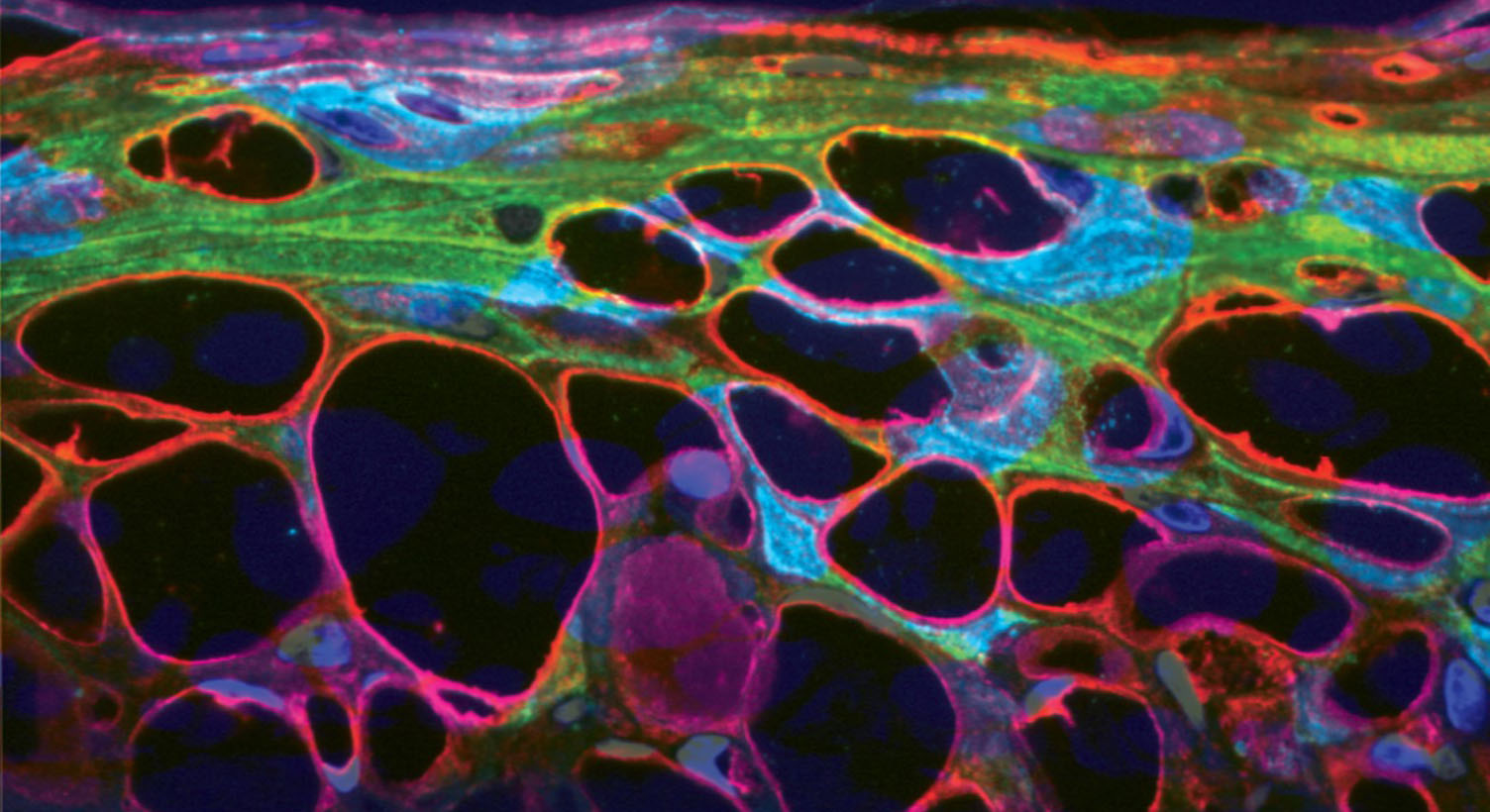
Modeling Glycobiology
Glycans decorate most proteins and cover all our cell membranes, yet our understanding of how glycans influence the lives of cells and organisms is limited.
We use gene editing, organotypic tissue models, and sophisticated mass spectrometry to decipher glycan functions. The genetically engineered cells and organotypic tissue model have provided evidence of the importance of glycans in tissue differentiation, cancer, and host-pathogen interactions.
We now use organotypic tissue models for broad discovery and dissection of the specific structure-function relationships by which glycans drive normal epithelial formation, transformation and interaction with viruses and the microbiome.
We aim to exploit this knowledge for new and targeted treatments for inflammation, cancer, tissue regeneration, and the development of novel viral vaccine strategies.
- Glycan functions in tissue homeostasis, stem cell biology, and regenerative medicine
- Glycans in host-pathogen interactions (Bacteria, Virus, and parasites)
- Creation of disease models
- Impact of glycans on inflammation, cancer, and degenerative diseases
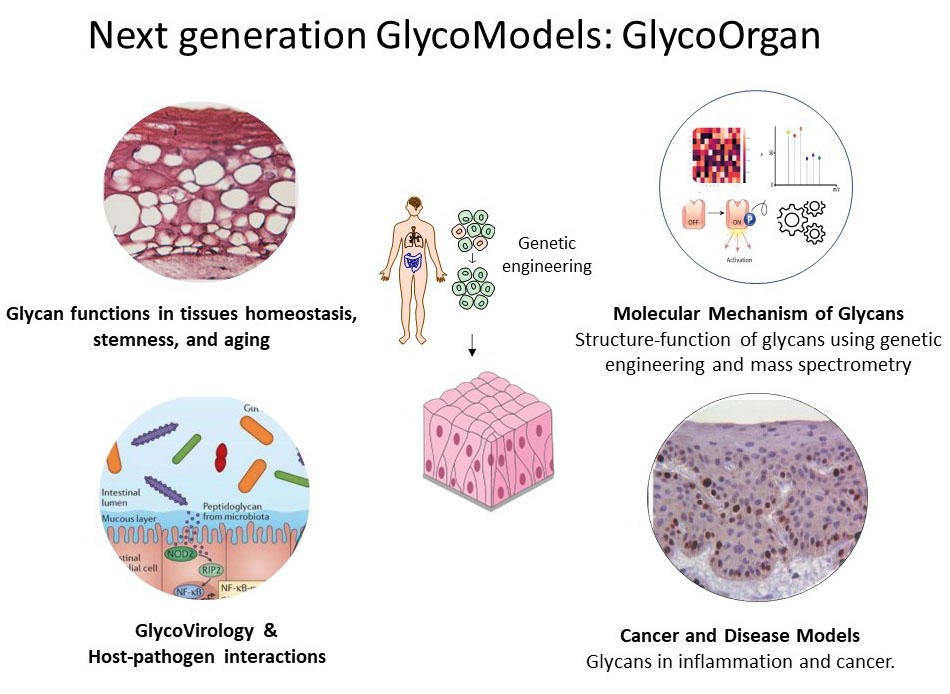
GlycoSkin.
Our understanding of how glycans influence the life of cells and organisms is limited, and only few functions have been molecularly dissected. We will use step-by-step genetic deconstruction of glycosylation capacities in organotypic tissue models for broad discovery and dissection of specific structure-function relationships driving normal epithelial formation, cancer transformation and interaction between the host and the microbiome.
Precise Cancer Targeting of Cancer Associated Glycans Changes in protein and lipid glycosylation are one of the most consistent alterations in human cancers. We use the next generation of genetically engineered 3D tissue models to systematically address the effect of cancer associated glycans in cancer biology and to develop cancer specific treatments. We have identified O-linked glycosylation signatures on proteins and developed a series of cancer specific mAbs to exploit O-glycan signatures for the precise targeting of cancer.
GlycoVirology: Probing the Functions of Glycosylation in Viral Biology This project aims to 1) characterize glycans on enveloped viruses using mass spectrometry and 2) to examine the glycan functions in virus biology using our comprehensive library of genetically engineered cells. We particularly focus on the importance of site-specific O-glycosylation. We have demonstrated that HSV-1 and other herpesviruses are heavily O-glycosylated and that this type of glycosylation is important for virus propagation and early immune sensing. The project will expand our knowledge on glycosylation in virus biology and help develop antivirals and vaccines. The project is heading by Assistant Professor Dr. Ieva Bagdonaite.
Precise genome engineering: The use of a novel genome editing technology has the power to redesign most living organisms with exquisite precision, speed and cost-effectiveness. We continuously implement the novel precise genetic engineering technologies.
Dissection of glycan functions
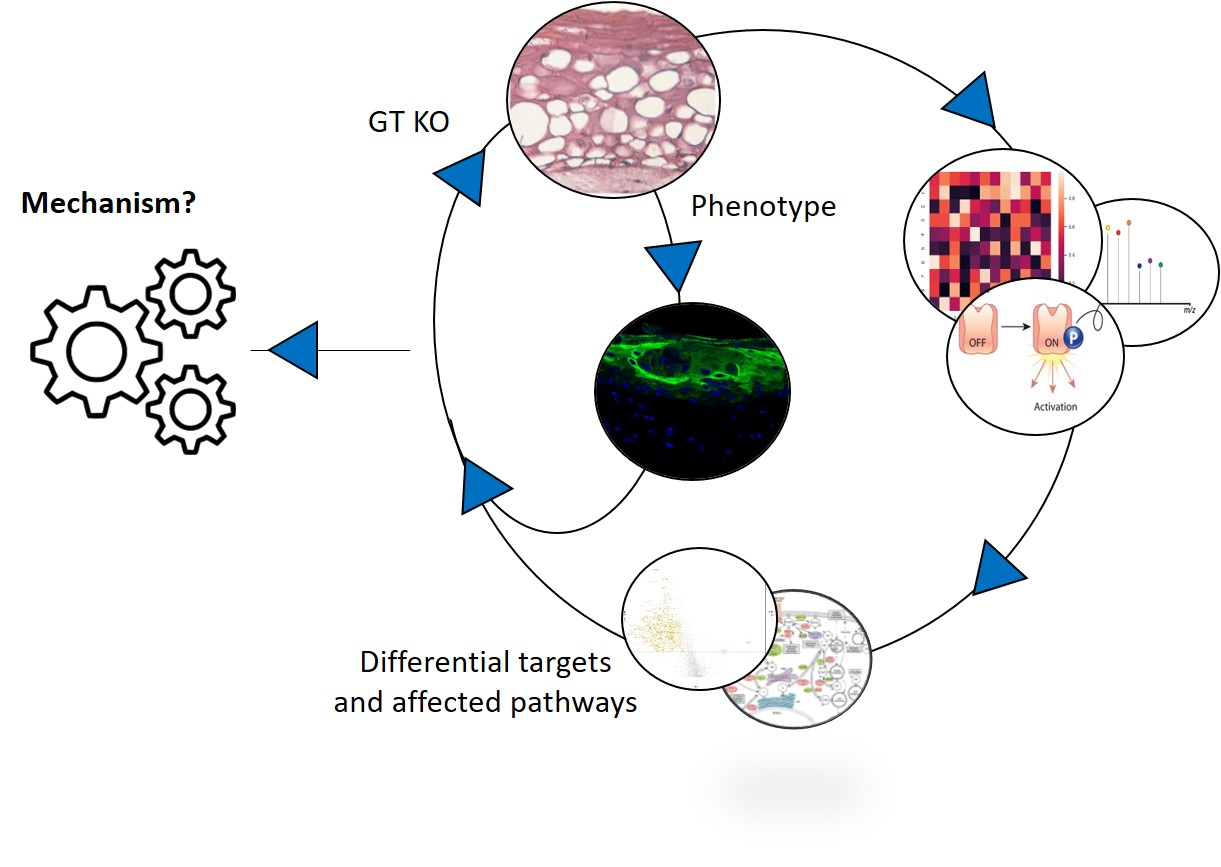
- Determine structure-function relationship for individual glycan structures
- Linking dynamic changes in tissue glycans structures to stemness, tissue rejuvenation, tissue stress, and aging
GlycoSkin>
- Development of a glycoengineered organotypic epithelial tissue model
- A systematic interrogation of glycan functions in human tissue formation and homeostasis
- Combined with mass spectrometry the model is a resource for further identification of glycan molecular functions.
- Aim is to examine the potential link between changes in glycans structures and stemness, tissue rejuvenation, cellular stress, cancer, and aging
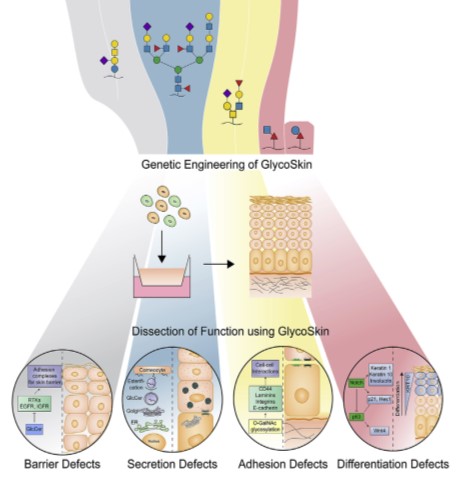
Dabelsteen, S, Pallesen, EM,……Wandall HH
Essential Functions of Glycans in Human Epithelia Dissected by a CRISPR-Cas9-Engineered Human Organotypic Skin Model. Developmental Cell. 2020.
Bagdonaite I, Pallesen EM, ….. Wandall HH.
O-glycan initiation directs distinct biological pathways and controls epithelial differentiation. EMBO Rep. 2020
Novel proteome-wide discovery strategy for O-glycosylation sites on viral envelope proteins using herpes simplex virus type 1 (HSV-1) as a model. We identified 74 O-linked glycosylation sites on 8 out of the 12 HSV-1 envelope proteins. With the use of precise gene editing, we further demonstrate that elongated O-glycans are essential for HSV-1 in human HaCaT keratinocytes.
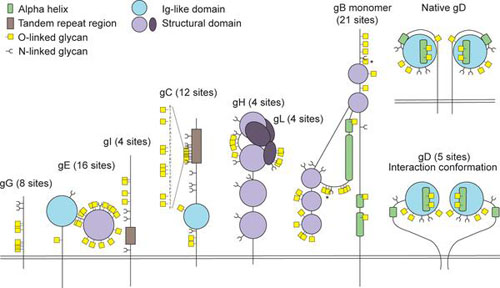
Bagdonaite I, Nordén R, Joshi HJ, Dabelsteen S, Nyström K, et al. (2015) A Strategy for O-Glycoproteomics of Enveloped Viruses—the O-Glycoproteome of Herpes Simplex Virus Type 1. PLoS Pathog 11(4): e1004784.
Our work has been funded by the following agencies:
- CPH Excellence Programme (2016 ,Facul Funds),
- Danish Council for Science,
- Danish Strategic Research Council,
- Danish Medical Research Council,
- The Lundbeck Foundation,
- Novo Nordisk Foundation,
- Danish National Research Foundation
- The Danish Council for Strategic Research, as represented by the Programme Commission on Strategic Growth Technologies
Dabelsteen S, Pallesen EMH, Marinova IN, Nielsen MI, Adamopoulou M, Rømer TB, Levann A, Andersen MM, Ye Z, Thein D, Bennett EP, Büll C, Moons SJ, Boltje T, Clausen H, Vakhrushev SY, Bagdonaite I, Wandall HH. Essential Functions of Glycans in Human Epithelia Dissected by a CRISPR-Cas9-Engineered Human Organotypic Skin Model. Dev Cell. 2020 Sep 14;54(5):669-684.e7
Bagdonaite I, Pallesen EM, Ye Z, Vakhrushev SY, Marinova IN, Nielsen MI, Kramer SH, Pedersen SF, Joshi HJ, Bennett EP, Dabelsteen S, Wandall HH. O-glycan initiation directs distinct biological pathways and controls epithelial differentiation. EMBO Rep. 2020 Jun 4;21(6)
Lavrsen K, Dabelsteen S, Vakhrushev SY, Levann AMR, Haue AD, Dylander A, Mandel U, Hansen L, Frödin M, Bennett EP, Wandall HH. De novo expression of human polypeptide N-acetylgalactosaminyltransferase 6 (GalNAc-T6) in colon adenocarcinoma inhibits the differentiation of colonic epithelium. J Biol Chem. 2017 Nov 29.
Mathiesen CBK, Carlsson MC, Brand S, Möller SR, Idorn M, Thor Straten P, Pedersen AE, Dabelsteen S, Halim A, Würtzen PA, Brimnes J, Ipsen H, Petersen BL, Wandall HH. Genetically engineered cell factories produce glycoengineered vaccines that target antigen-presenting cells and reduce antigen-specific T-cell reactivity. J Allergy Clin Immunol. 2018 Dec;142(6)
Nielsen MI, Stegmayr J, Grant OC, Yang Z, Nilsson UJ, Boos I, Carlsson MC, Woods RJ, Unverzagt C, Leffler H, Wandall HH. Galectin binding to cells and glycoproteins with genetically modified glycosylation reveals galectin-glycan specificities in a natural context. J Biol Chem. 2018 Dec 28;293(52)
King SK, Joshi HJ, Schjoldager KT, Halim A, Madsen TD, Dziegiel MH, Woetmann A, Vakhrushev SY, Wandall HH. Characterizing the O Glycosylation Landscape of Human Plasma, Platelets and Endothelial Cells. Blood Adv. 2017 Feb 23;1(7):429-442.
Bagdonaite I, Nordén R, Joshi HJ, King SL, Vakhrushev SY, Olofsson S, Wandall HH. Global Mapping of O-Glycosylation of Varicella Zoster Virus, Human Cytomegalovirus, and Epstein-Barr Virus. J Biol Chem. 2016 Jun 3;291(23) Epub 2016 Apr 15.
Bagdonaite I, Nordén R, Joshi HJ, Dabelsteen S, Nyström K, Vakhrushev SY, Olofsson S, Wandall HH. A Strategy for O-Glycoproteomics of Enveloped Viruses-the O-Glycoproteome of Herpes Simplex Virus Type 1.PLoS Pathog. 2015 Apr 1
Yang Z, Wang S, Halim A, Schulz MA, Frodin M, Rahman SH, Vester-Christensen MB, Behrens C, Kristensen C, Vakhrushev SY, Bennett EP, Wandall HH, Clausen H. Engineered CHO cells for production of diverse, homogeneous glycoproteins. Nature Biotechnol. 2015 Aug;33(8) Epub 2015 Jul 20.
Lonowski LA, Narimatsu Y, Riaz A, Delay CE, Yang Z, Niola F, Duda K, Ober EA, Clausen H, Wandall HH, Hansen SH, Bennett EP, Frödin M.Genome editing using FACS enrichment of nuclease-expressing cells and indel detection by amplicon analysis. Nat Protoc. 2017 Mar;12(3)
Radhakrishnan P, Dabelsteen S, Madsen FB, Francavilla C, Kopp KL, Steentoft C, Vakhrushev SY, Olsen JV, Hansen L, Bennett EP, Woetmann A, Yin G, Chen L, Song H, Bak M, Hlady RA, Peters SL, Opavsky R, Thode C, Qvortrup K, Schjoldager TBG, Clausen H, Hollingsworth MA, and Wandall, HH Immature truncated O-glycophenotype of cancer directly induces oncogenic features. Proc Natl Acad Sci USA 2014, August 11.
Wandall HH, Blixt O, Tarp MA, Pedersen JW, Bennett EP, Mandel U, Ragupathi G, Livingston PO, Hollingsworth MA, Taylor-Papadimitriou J, Burchell J, Clausen H. Cancer biomarkers defined by autoantibody signatures to aberrant O-glycopeptide epitopes. Cancer Res. 2010 Feb 1. Epub 2010 Feb 2
Anne Louise Tølbøll Sørensen, Henrik Clausen, Hans H Wandall. Carbohydrate Clearance Receptors in Transfusion Medicine. (Review Article). BBA - General Subjects. Jul 27
- ALK-Abello A/S
- Cord Brakebusch, BRIC,
- Sally Dabelsteen, Department of Odontology of Health Sciences, University of Copenhagen.
- Morten Frödin, BRIC,
- Michael Hollingsworth, University of Nebraska, Omaha, NE
- Usha Menon & Aleksandra Gentry-Maharaj, Institute for Women's Health, University College London, UK.
- Sigvard Olofsson, University of Gothenburg
- Anders E. Pedersen, Department of International Health, Immunology and Microbiology, Faculty of Health and Medical Sciences, University of Copenhagen.
- Bent Larsen Petersen, Department of Plant- and Environmental science, Plant Glycobiology
- Søren Skov, Department of Veterinary Disease Biology, University of Copenhagen.
- Steffen Thiel, Department of Biomedicine, Aarhus
- Anders Woetmann and Niels Ødum, Department of International Health, Immunology and Microbiology, Faculty of Health and Medical Sciences, University of Copenhagen.
-
Consultant for and founder of GO-therapeutics focusing on development of antibodies for immunotherapy of cancer (http://gotherapeutics.com).
-
Co-founder and consultant for early stage biotech initiative for the development of antibodies to various non-glycosylated targets (Ebumab Aps & Hemab Aps).
-
Established Wandall ApS to control consultant activities.
The Danish Council for Strategic Research, as represented by the Programme Commission on Strategic Growth Technologies

Danish National Research Program "Sapere Aude – Project leader”
European Research Council - "ERC Consolidator Grant"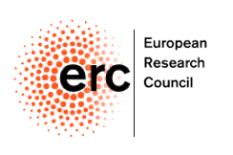
 Group Leader
Group Leader
Hans H. Wandall
Professor, MD, PhD
Deputy head of department, Innovation
hhw@sund.ku.dk
(+45) 23 84 01 56 / (+45) 35 33 55 53
CV, publications, etc

